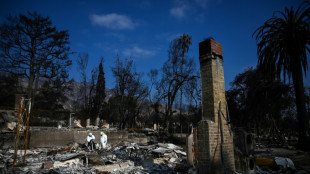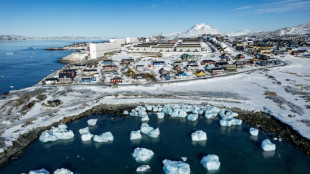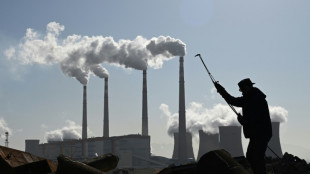
-
 Sinner's former physio to blame for failed dope tests, says ex-physical trainer
Sinner's former physio to blame for failed dope tests, says ex-physical trainer
-
Germany slams Trump tariffs, US tech titans in crosshairs

-
 Trump tariff blitz sparks retaliation threats, economic fears
Trump tariff blitz sparks retaliation threats, economic fears
-
Search for Malaysia's long missing MH370 suspended

-
 Hungary announces ICC withdrawal as Israel's Netanyahu visits
Hungary announces ICC withdrawal as Israel's Netanyahu visits
-
Trump's tariffs sting Asian giants, including US allies

-
 India says 'examining the implications' of US tariffs
India says 'examining the implications' of US tariffs
-
Evenepoel set to make injury return at Tour de Romandie

-
 USA sole bidder for 2031 Women's World Cup, UK set to host in 2035 - Infantino
USA sole bidder for 2031 Women's World Cup, UK set to host in 2035 - Infantino
-
McLaren's Norris says it's 'our turn' for success

-
 Lessons and liquids: buried alive in Myanmar's earthquake
Lessons and liquids: buried alive in Myanmar's earthquake
-
Trump tariffs spark fears for Asian jobs, exporting sectors

-
 Stocks and dollar sink, havens rally as Trump tariffs fan trade war
Stocks and dollar sink, havens rally as Trump tariffs fan trade war
-
Runners fly to North Korea for first post-Covid Pyongyang Marathon

-
 Hamilton rubbishes claims he's lost faith in Ferrari
Hamilton rubbishes claims he's lost faith in Ferrari
-
Nintendo Switch 2 sparks excitement despite high price

-
 Sri Lanka's crackdown on dogs for India PM's visit sparks protest
Sri Lanka's crackdown on dogs for India PM's visit sparks protest
-
S Korea police raise security levels ahead of impeachment verdict

-
 China vows 'countermeasures' to sweeping new US tariffs
China vows 'countermeasures' to sweeping new US tariffs
-
Trump jolts allies, foes and markets with tariff blitz

-
 France says EU to target US online services after Trump tariffs
France says EU to target US online services after Trump tariffs
-
Tsunoda vows to bring 'something different' after Red Bull promotion

-
 Verstappen not happy with Tsunoda-Lawson Red Bull swap
Verstappen not happy with Tsunoda-Lawson Red Bull swap
-
Experts accuse 54 top Nicaragua officials of grave abuses

-
 Remains of 30th victim of Los Angeles fires found
Remains of 30th victim of Los Angeles fires found
-
EU to target US online services after Trump tariffs: France

-
 How Trump's 'liberation day' tariffs will impact China
How Trump's 'liberation day' tariffs will impact China
-
Malaysia suspends search for long-missing flight MH370

-
 Search for long-missing flight MH370 suspended: Malaysia minister
Search for long-missing flight MH370 suspended: Malaysia minister
-
Europe hits out at Trump tariffs, keeps door open for talks

-
 Myanmar's junta chief to head to Bangkok summit as quake toll surpasses 3,000
Myanmar's junta chief to head to Bangkok summit as quake toll surpasses 3,000
-
Lawson vows to prove he belongs in F1 after shock of Red Bull axing

-
 Australia sweats through hottest 12 months on record: official data
Australia sweats through hottest 12 months on record: official data
-
Livestock theft is central to jihadist economy in west Africa

-
 South African artist champions hyenas in 'eco-queer' quest
South African artist champions hyenas in 'eco-queer' quest
-
Danish PM in 'unity' Greenland visit amid US takeover threats

-
 Taiwan says US tariffs 'highly unreasonable'
Taiwan says US tariffs 'highly unreasonable'
-
Lawson says ruthless Red Bull axing was 'tough to hear'

-
 Heat humble Celtics for sixth straight win, Thunder roll on
Heat humble Celtics for sixth straight win, Thunder roll on
-
Trump escalates trade war with sweeping global tariffs

-
 Japan says US tariffs 'extremely regrettable', may break WTO rules
Japan says US tariffs 'extremely regrettable', may break WTO rules
-
South Koreans anxious, angry as court to rule on impeached president

-
 Juve at in-form Roma with Champions League in the balance
Juve at in-form Roma with Champions League in the balance
-
Injuries put undermanned Bayern's title bid to the test

-
 Ovechkin scores 892nd goal -- three away from Gretzky's NHL record
Ovechkin scores 892nd goal -- three away from Gretzky's NHL record
-
Australian former rugby star Petaia signs for NFL's Chargers

-
 China says opposes new US tariffs, vows 'countermeasures'
China says opposes new US tariffs, vows 'countermeasures'
-
Athletics world watching as 'Grand Slam Track' prepares for launch

-
 Heat humble Celtics for sixth straight win, Cavs top Knicks
Heat humble Celtics for sixth straight win, Cavs top Knicks
-
Quake-hit Myanmar's junta chief to head to Bangkok summit


2024 'certain' to be hottest year on record: EU monitor
This year is "effectively certain" to be the hottest on record and the first above a critical threshold to protect the planet from dangerously overheating, Europe's climate monitor said Monday.
The new benchmark affirmed by the Copernicus Climate Change Service caps a year in which countries rich and poor were hammered by disasters that scientists have linked to humanity's role in Earth's rapid warming.
Copernicus said an unprecedented spell of extraordinary heat had pushed average global temperatures so high between January and November that this year was sure to eclipse 2023 as the hottest yet.
"At this point, it is effectively certain that 2024 is going to be the warmest year on record," the EU agency said in its monthly bulletin.
In another grim milestone, 2024 will be the first calendar year more than 1.5 degrees Celsius hotter than pre-industrial times before humanity started burning large volumes of fossil fuels.
Scientists warn that exceeding 1.5C over a decades-long period would greatly imperil the planet, and the world agreed under the Paris climate accord to strive to limit warming to this safer threshold.
Copernicus Climate Change Service deputy director Samantha Burgess said a single year above 1.5C "does not mean that the Paris Agreement has been breached, but it does mean ambitious climate action is more urgent than ever".
- Cost of inaction -
The world is nowhere near on track to meeting the 1.5C target.
In October, the UN said the current direction of climate action would result in a catastrophic 3.1C of warming.
Emissions from fossil fuels keep rising despite a global pledge to move the world away from coal, oil and gas.
When burned, fossil fuels release greenhouse gases that warm Earth's oceans and atmosphere, disrupting climate patterns and the water cycle.
Scientists say that global warming is making extreme weather events more frequent and ferocious, and even at present levels climate change is taking its toll.
2024 saw deadly flooding in Spain and Kenya, violent tropical storms in the United States and the Philippines, and severe drought and wildfires across South America.
In total, disasters caused $310 billion in economic losses in 2024, Zurich-based insurance giant Swiss Re said this month.
Developing countries are particularly vulnerable and by 2035 will need $1.3 trillion a year in outside assistance to cope with climate change.
At UN climate talks in November, wealthy countries committed $300 billion annually by 2035, an amount decried as woefully inadequate.
- 'Exceptional' -
Copernicus uses billions of measurements from satellites, ships, aircraft and weather stations to aid its climate calculations.
Its records go back to 1940 but other sources of climate data -- such as ice cores, tree rings and coral skeletons -- allow scientists to expand their conclusions using evidence from much further in the past.
Scientists say the period being lived through right now is likely the warmest the Earth has been for the last 125,000 years.
Even by these standards, the extraordinary heat witnessed since mid-2023 has sparked scientific debate.
2024 began at the peak of El Nino, a natural phenomenon that moves around warm water, helping raise global temperatures.
But scientists said that such cyclical variability could not alone explain the record-breaking heat in the atmosphere and seas.
After the latest El Nino, temperatures were starting to fall but "very slowly, and the causes will have to be analysed", Robert Vautard, a scientist of the IPCC, the UN's expert climate advisory body, told AFP.
Last week, a study published in the peer-reviewed journal Science suggested a lack of low-lying clouds could be causing less heat to bounce back into space.
A separate paper in May explored the possibility that cleaner-burning shipping fuels were releasing less mirror-like particles into clouds, dimming their reflectivity.
Copernicus climate scientist Julien Nicolas said recent years were "clearly exceptional".
"As we get more data, we will hopefully better understand what happened," he told AFP.
G.Stevens--AMWN


